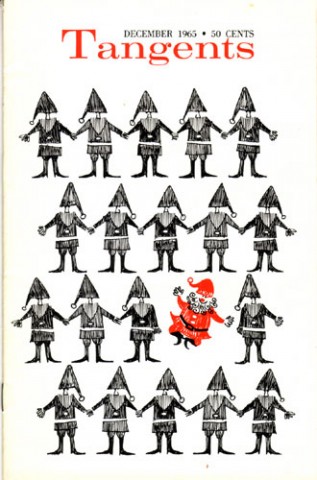Sexual Behavior and the Law
by Samuel G. Kling
Published by Bernard Geis Associates, distributed by Random House
Published 1965 • Law (sexuality) • 301 pp.
Reviewed by Vern L. Bullough
Originally published in Tangents, December 1965, pp. 24–25
This book promises both more and less than it delivers. It not only attempts an analysis of various laws governing sex, but it also purports to delve into psychological, sociological, and medical aspects as well. As a general guide to the interested but uninformed public it serves a valuable purpose, but as a guide to a person with a serious problem it contains a great deal of misinformation. It does give a summary of various state laws on different aspects of sex but in this it is not complete nor comprehensive enough to be of significant
Samuel G. Kling, the author, is a lawyer and marriage counselor and his syndicated column on marriage appeared in many newspapers. His advice in the book is about on the level of a popular newspaper columnist and if this is the kind of information you want, he is the man for you.
Unfortunately he at times has not really bothered to do any research. His book is divided into chapters on abortion, adultery and fornication, annulments, aphrodisiacs, artificial insemination, birth control and contraceptives, homosexual behavior, illegitimacy, impotence and frigidity, incest, pornography, prostitution, rape, sexual deviations, sex rights in marriage and divorce, and sterilization. It is arranged in a question and answer series. To what extent are aphrodisiacs bound up with folklore? Does alcohol increase or deaden sexual desire? Do homosexuals accept or reject themselves? Do homosexuals marry women? May a single woman adopt a child?
Obviously none of these questions have to do with law, except the last and in answering this with a yes, he is entirely misleading. The selections could be continued but the sample gives the tone of the book. Usually his answers are common sense, but often they are entirely erroneous. He claims for example that coitus interruptus is as safe as most other methods of contraception. Those people who believe that he is giving the results of up-to-date research are bound to be disappointed since most researchers now claim that coitus interruptus is almost 100% ineffective in preventing pregnancy.
In general he asks a lot of questions and does not particularly care from which source he gets the answer. He cites Havelock Ellis and Albert Ellis, Alfred Kinsey and Sigmund Freud with equal abandon without bothering to find out whether his authority is particularly pertinent to the point or what the latest findings might be.
Despite these rather negative statements, I find there is much good in the book, but probably not for the readers of Tangents. Kling has aimed his book at the worried housewife, mother, husband or father and here the fact that he holds that many of our sex laws are primitive, outdated, and unworkable, and should be reformed, puts him on the side of the angels. But not too far. For example he asks the question, Should our laws against homosexuality be made more stringent? He answers:
No. Our present laws are probably too punitive already. Certainly they have not succeeded in deterring homosexuality nor is there any prospect they will. Actually, our unscientific sex laws encourage homosexuality instead of curing or preventing it. Sending a homosexual to prison is an almost certain method of not only perpetuating homosexual behavior in the prisoner but of adding new recruits as well.
 Obviously his heart is in the right place, and any person who urges a change in sex laws is all to the good. I wish him well.
Obviously his heart is in the right place, and any person who urges a change in sex laws is all to the good. I wish him well.
Vern L. Bullough is professor of history at San Fernando Valley State College, and chairman of the Committee on Sex and Civil Liberties for the American Civil Liberties Union. He is the author of A History of Prostitution (University Books, 1964) and of other books.


